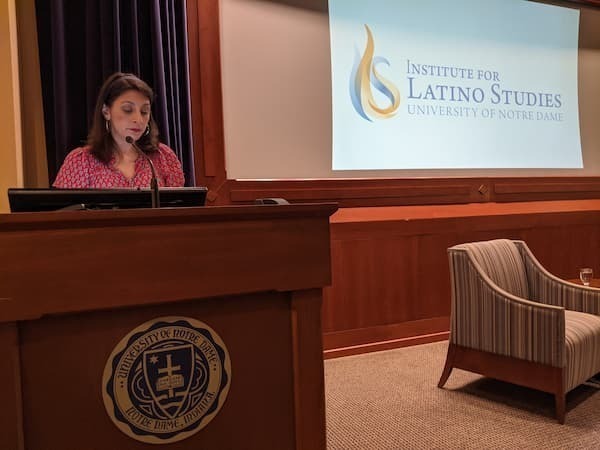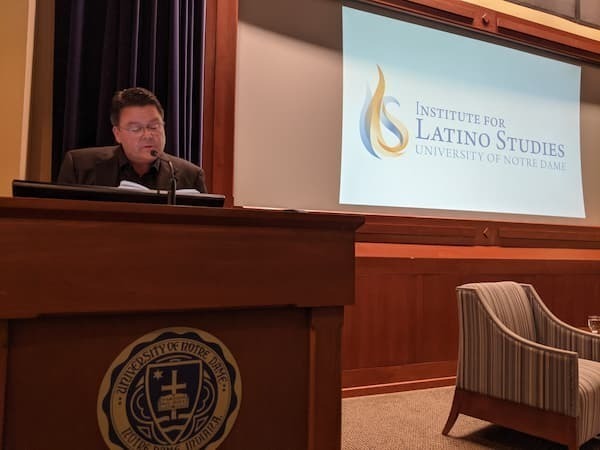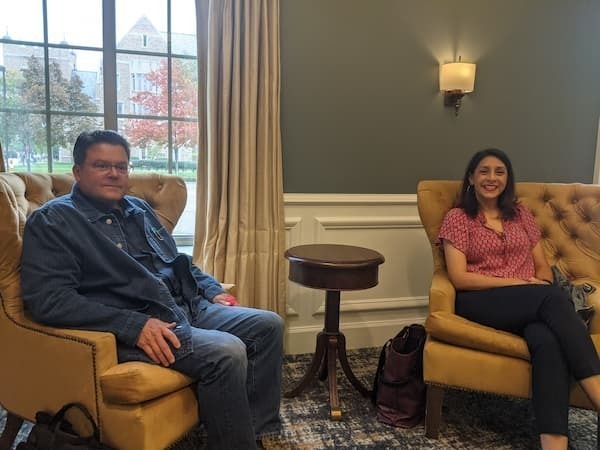The first couple of weeks of Hispanic Heritage Month at Notre Dame saw a variety of enriching events. Among those was the September 27th poetry reading and conversation with two acclaimed poets: Luivette Resto and Fred Arroyo.
Born in Aguas Buenas, Puerto Rico, and raised in the Bronx, Luivette Resto is an award-winning poet best known for her poetry discussing cultural identity and love. Luivette has written three poetry books so far, Unfinished Portrait, Ascension, and her latest Living on Islands Not Found on Maps. Through these works, she shares her experiences as a mother, as a woman, and of the world. She is a CantoMundo and Macondo Fellow, a Pushcart Prize nominee, and is on the Board of Directors for Women Who Submit, a non-profit organization in Los Angeles that focuses its efforts on women and nonbinary writers.

Fred Arroyo is a Puerto Rican-American author currently teaching English at Middle Tennessee State University. His works include Western Avenue and Other Fictions, The Region of Lost Names: A Novel, and Sown in Earth. Arroyo writes about his journey over the course of his life and about the grander experiences of men like his hard-working father. His writings have been included in the Library of Congress series Spotlight on U.S. Hispanic Writers and in anthologies like Camino del Sol: Fifteen Years of Latina and Latino Writing and The Colors of Nature: Essays on Culture, Identity and the Natural World.
The event came as a launching point for the 20th anniversary of the Letras Latinas literary initiative, spearheaded by Professor Francisco Aragón. As the director of the initiative, Aragón organized Arroyo’s and Resto’s visit to campus. It was quite the turnout, and there was much buzz prior to the start of the talk as everyone began to pile into the reading room. Aragón opened the conversation with a few words regarding Letras Latinas, its outlook for the rest of the year, and its bright future. Professor Roy Scranton, director of the Creative Writing Program at Notre Dame, spoke next on behalf of the program and as a collaborator for the event.
Scranton introduced Sofia Villamil Durán, an undergraduate senior, Letras Latinas associate, and contributing blog editor for Letras Latinas Blog 2. With an admiring introduction, she opened the floor for “the wonder woman of poetics” Luivette Resto. Resto dove right into reading from her work and she provided the audience with a heartfelt and lively background of each chosen poem to complement its serious themes. Her reading proved to be warm, colorful, and profound. She talked about her family, her role as a mother, the importance of her Boricua identity, and the internal and external struggles she faces. Her words could only be described as completely human as she guided everyone in the room - students, faculty, and friends alike - between both shared laughter and engaged pensiveness.
Laura Villareal, a Letras Latinas Associate and co-editor of Letras Latinas Blog 2, followed Resto’s reading with an introduction to “Master of Memory” by Fred Arroyo. Her poetic opening appropriately prefaced Arroyo’s prose reading. He walked the audience through the story of his life, from childhood to becoming a writer. Arroyo slowed time through the details of his life, and, like Resto had before, depicted humanness in all its complexities. He described his work as an ode to his family as well as his journey. Arroyo’s authenticity was unmistakable, and he did not shy away from becoming emotional throughout his reading.

After their readings, Resto and Arroyo held a conversation about their writings and dove deeper into what influenced them. They discussed the power of language in modern culture and the cultural comparisons that could arise, contemporary language barriers, cultural separation and its effects, and poetry and prose in general. They then went on to read some of their newer preselected pieces and concluded the event by answering some questions from the audience.
Questions for the two writers primarily came from students. Arroyo and Resto answered with some advice to students saying that “it’s never too late” to start a relationship with literacy and pursue writing or the journey of self-expression. Regarding confidence as a writer, they advised students to “own their writing” and to write “without an audience in mind.” Afterward, students in attendance were eager to talk to both Arroyo and Resto and to grab their own copies of their most recent books.
At the end of the formal conversation, Arroyo, moved by the student attendance and engagement, called his experience a “gift to affirm [his] writing” for the future. Similarly, Resto felt fulfilled by the experience and highlighted the “feeling of nourishment” that community gatherings can stimulate in a writer. Both spoke about “comunidad” as an important aspect of writing as Latinos; for aspiring Latino authors and poets, Resto and Arroyo believe comunidad is essential.

Sofia Villamil Durán considered the event to be exciting and an enriching representation of Puerto Rican poetry. After the event she said, “It brought together a community of writers and Latinos for Hispanic Heritage Month which was great to experience and be a part of.” Other students also considered the event to be fun, inspiring, and “a space people could resonate with.”
Francisco Aragón considered it a success as well. Later he stated, “What I found particularly gratifying was witnessing what appeared to be meaningful exchanges between students and Fred and Luivette while they were signing books…When students are in the classroom reading, discussing, and writing about works of literature, having the opportunity to actually see living authors perform their work live, and getting to meet with them afterward, can really make a big difference. It takes learning to a whole other level.” He too emphasizes the importance of community for Latino students and plans to cultivate more meaningful opportunities for student growth in the future.